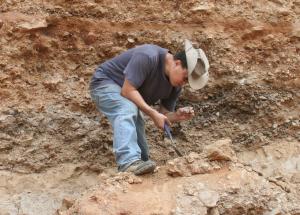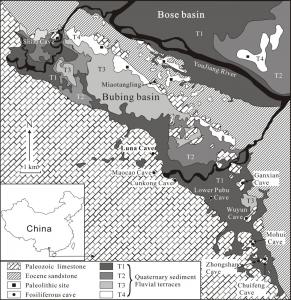By Staff Reports
(Oahu)– Scientists are now considering the possibility that the exodus of modern man from Africa may have been earlier than 60,000 years ago as traditionally thought. Christopher Bae, a paleoanthropologist at UH Mānoa, and Wei Wang of the Guangxi Museum of Nationalities in Nanning, China, led a team of researchers that discovered two teeth in Lunadong, a cave site located in Guangxi, southern China.
Found in stratified deposits dating between 70,000 and 126,000 years ago, a time period when China was traditionally thought to have been only occupied by more archaic human species, at least one of the teeth can be comfortably assigned to modern Homo sapiens. Dating results of the Lunadong teeth, which include a right upper second molar and a left lower second molar, indicate that the molars may be as old as 126,000 years.
“The findings from the Lunadong study clearly indicate that certain aspects of the Out of Africa model need to be rethought. That is, that there was at least one other earlier Out of Africa migration event that predated 60,000 years ago. This paleoanthropological find, in addition to other recent studies from western and southern Asia, suggest that modern humans may have dispersed out of Africa in multiple waves rather than as one major single migration event 60,000 years ago as commonly thought,” said Bae.
The Out of Africa theory suggests that modern humans migrated from Africa approximately 60,000 years ago following a southern route along the Arabian Peninsula to Southeast Asia. Recent fossil finds in eastern Asia, including the Lunadong teeth, support the theory of a more complicated dispersal model with migrations not only occurring earlier than originally believed, but also involving later dispersal patterns from Northwest Asia to Europe, and finally into Siberia then the Americas.
Bae has spent the past two decades developing a deeper understanding of the eastern Asian human evolutionary record. He has published extensively on a wide range of topics related to eastern Asian paleoanthropology, with many publications appearing in top tier scientific journals. He has also co-edited Asian Paleoanthropology: From Africa to China and Beyond (2010; Springer) and three special issues of the journal Quaternary International (2010, 2012, 2014).
After completing his PhD at Rutgers University and spending two years conducting multidisciplinary paleoanthropological postdoctoral research at the Institute of Vertebrate Paleontology and Paleoanthropology in Beijing, China, he came to UH Mānoa in 2008. He is currently an Associate Professor based in the Department of Anthropology in the College of Social Sciences.
Funding for the paleoanthropological research in Guangxi was provided by grants from the Wenner-Gren Foundation for Anthropological Research, the National Geographic Society, and the 2014 UH Mānoa College of Social Sciences Research Award.
Full photo caption for the Lunadong teeth: Various views of the two human teeth from Lunadong: upper (LN0031); lower (LN0030). Views from left to right: occlusal view; mesial view; distal view; buccal view; lingual view.
Formally established in 1934, the Department of Anthropology at the University of Hawai‘i at Mānoa is committed to the study of human culture. Students receive comprehensive training in critical thinking as they explore and develop a global understanding of culture and society through comparative, holistic studies of communities. Specializations include applied archaeology, ecology, medical anthropology, and discursive practices, with particular focus in Hawai‘i, Asia, the Pacific Islands, and the United States.
The College of Social Sciences (CSS) at the University of Hawai‘i at Mānoa is engaged in a broad range of research endeavors that address fundamental questions about human behavior and the workings of local, national and international political, social, economic and cultural institutions. Its vibrant student-centered academic climate supports outstanding scholarship through internships, and active and service learning approaches to teaching that prepare students for the life-long pursuit of knowledge.



